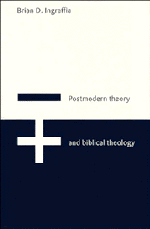Book contents
- Frontmatter
- Contents
- Acknowledgements
- List of abbreviations
- Note on translations of the Bible
- Introduction: postmodernism, ontotheology, and Christianity
- 1 NIETZSCHE'S MOCKERY: THE REJECTION OF TRANSCENDENCE
- 1 The death of God: loss of belief in the Christian God as the cause of nihilism
- 2 Vanquishing God's realm: Nietzsche's abolition of the true world
- 3 Nietzsche on the Judaeo-Christian denial of the world
- 4 The redemptive–eschatological separation between the present world and the world to come in the New Testament
- 5 On redemption: the eternal return or biblical eschatology
- II HEIDEGGER'S FORGETTING: THE SECULARIZATION OF BIBLICAL ANTHROPOLOGY
- III DERRIDA'S DENIALS: THE DECONSTRUCTION OF ONTOTHEOLOGY
- Conclusion: ontotheology, negative theology, and the theology of the cross
- Notes
- Bibliography
- Index
3 - Nietzsche on the Judaeo-Christian denial of the world
Published online by Cambridge University Press: 01 June 2011
- Frontmatter
- Contents
- Acknowledgements
- List of abbreviations
- Note on translations of the Bible
- Introduction: postmodernism, ontotheology, and Christianity
- 1 NIETZSCHE'S MOCKERY: THE REJECTION OF TRANSCENDENCE
- 1 The death of God: loss of belief in the Christian God as the cause of nihilism
- 2 Vanquishing God's realm: Nietzsche's abolition of the true world
- 3 Nietzsche on the Judaeo-Christian denial of the world
- 4 The redemptive–eschatological separation between the present world and the world to come in the New Testament
- 5 On redemption: the eternal return or biblical eschatology
- II HEIDEGGER'S FORGETTING: THE SECULARIZATION OF BIBLICAL ANTHROPOLOGY
- III DERRIDA'S DENIALS: THE DECONSTRUCTION OF ONTOTHEOLOGY
- Conclusion: ontotheology, negative theology, and the theology of the cross
- Notes
- Bibliography
- Index
Summary
We are far from claiming that the world is worth less; indeed it would seem laughable to us today if man were to insist on inventing values that were supposed to excel the value of the actual world. This is precisely what we have turned our backs on as an extravagant aberration of human vanity and unreason that for a long time was not recognized as such. It found its final expression in modern pessimism, and a more ancient and stronger expression in the teaching of Buddha; but it is part of Christianity also, if more doubtfully and ambiguously so but not for that reason any less seductive.
Nietzsche, The Gay ScienceWe have seen that Nietzsche indicts Christianity for basing its ideals and values upon a fictitious true world. The origin of this critique can be found in the work of Ludwig Feuerbach. Although Nietzsche develops and extends Feuerbach's critique of Christianity, he begins from the same presuppositions as his predecessor. He argues that both God and God's realm are fictitious, imaginative projections of man. And Nietzsche repeats Feuerbach's conclusion that if God is a fiction, then he is in reality nothing. According to Feuerbach, “the Divine essence … is only something in the imagination, but in truth and reality nothing.”
Nietzsche follows Feuerbach in asserting that man projects his own values onto a transcendent God and a transcendent realm, thereby denying his own value.
- Type
- Chapter
- Information
- Postmodern Theory and Biblical TheologyVanquishing God's Shadow, pp. 46 - 61Publisher: Cambridge University PressPrint publication year: 1995



